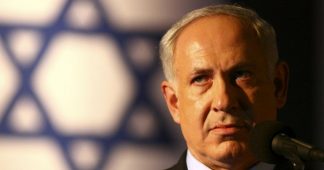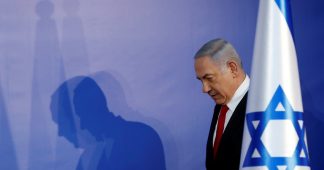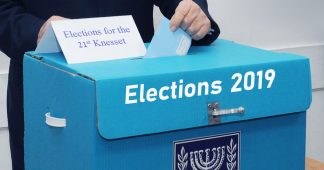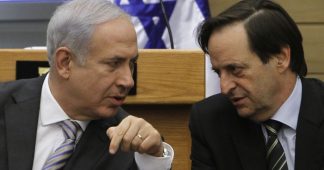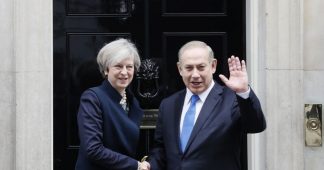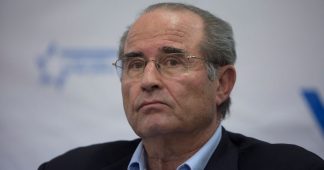By Jean Shaoul
4 September 2019
Israeli Prime Minister Benjamin Netanyahu is pulling out of all the stops to ensure his Likud and the far-right parties win the September 17 election, enabling him to head a government that will save him from jail.
Facing indictment on corruption charges, which—on the basis of leaked videos whose authenticity Netanyahu has not denied—could put him behind bars for the rest of his life, his aim is to secure agreement for legislation that will prevent the indictment of a sitting prime minister.
These elections were made necessary by his inability to assemble a governing coalition, despite Likud winning 35 seats in the April 9 election.
A deep crisis of rule grips Israel, provoked by the twin pressures of the decades-long military suppression of the Palestinian people and the increasing social inequality within Israel itself, which ranks among the highest in the developed world. Political and social tensions are so great that the traditional mechanisms of bourgeois democracy are breaking down.
The polls show Netanyahu’s Likud party in a dead heat with Blue and White, the so-called “centre-left” opposition bloc led by Benny Gantz, the former chief of staff of the Israel Defence Forces (IDF), with neither able to secure a majority bloc in the 120-seat Knesset. In essence, the electorate faces a choice between a far-right incumbent lurching rapidly toward outright fascism and an apartheid state and a right-wing former army chief of staff who attacks Netanyahu as being weak on national security, boasts of how many Palestinians he had killed in the 2014 Israeli war against Gaza, and calls for an even more aggressive approach to the territory, the largest open-air prison on the planet.
Netanyahu has bolstered Likud’s position by merging it with his Finance Minister Moshe Kahlon’s Kulanu Party, a split-off from Likud, which won four seats in the April election. He has also sought to shore up Likud by putting intense pressure on several small right-wing parties to pull out of the election or merge with Likud to avoid “wasting” their votes should they fail to obtain 3.25 percent of the votes cast, the minimum threshold for entering the Knesset.
His political allies, Moshe Feiglin’s far-right Zehut Party and the fascist Jewish Power Party are predicted to get just 1.2 percent and 1.8 percent, respectively. Jewish Power is a spinoff from the Kach party of Meir Kahane, banned as a terrorist organisation, that openly advocates violence and the expulsion of the Palestinian population.
Last Thursday, Netanyahu secured a pledge from Zehut to stand down in the elections, after promising Feiglin, a Likud member till 2015, a ministerial post, the legalisation of medical marijuana imports, which is less than his party’s demand for the full cannabis legalisation, and a two-year freeze on taxes for new businesses.
Netanyahu’s former far-right justice minister, Ayelet Shaked, heads the newly formed Yamina, an alliance of nationalist parties, which campaigned in the April election under the name of the New Right, but failed to cross the electoral threshold. This new formation essentially reconstitutes the bloc she and Education Minister Naftali Bennett dismantled last December. She had originally sought to get a reserved spot on the Likud list after Netanyahu announced fresh elections in May. Their former Orthodox allies, Jewish Home and Bezalel Smotrich’s National Union, have merged with Shaked’s secular Yamina, which together could win up to 10 seats.
Shaked has backed Netanyahu in his attempt to secure immunity from prosecution. According to a report in Ha’aretz, she even offered to use her influence with Attorney General Avichai Mandelblit to prevent Netanyahu’s indictment on corruption charges. Both Mandelblit and Shaked have denied any such discussions, with Mandelblit saying that he would oppose any efforts to grant the premier immunity.
Bennett has retracted his previous opposition to granting Netanyahu immunity from prosecution, saying that with Israel facing its second election in a year, what the country needed above all was “stability.”
Netanyahu’s other allies, the ultra-Orthodox United Torah Judaism and Shas parties, are expected to win eight and seven seats, respectively.
Gantz’s Blue and White bloc would garner 44 seats. He set up the party as an electoral vehicle for those layers in the military-intelligence establishment and big business who seek to oust Netanyahu. His coalition includes two other former military commanders and Yair Lapid, a former television host who heads the centrist Yesh Atid.
Gantz would seek to form a coalition with the Labour Party, which has just formed an alliance with Orli Levi-Abekasis’s Gesher party, which failed to enter the Knesset in April. Two Labour legislators have quit the party: Stav Shaffir to join the new Democratic Union and Shelly Yacimovich to quit the Knesset for the time being at least. The virtual disintegration of Israel’s founding Labour party, which controlled the government for the first three decades of the country’s 71-year history, testifies to the rightward movement of the Israeli ruling class.
Labour did nothing to support the teachers who had threatened a national strike on September 1, the start of the school year, leaving the court to ban the secondary school teachers’ strike and the Israel Teachers Union to sell out the primary school teachers.
In another telling move, the liberal Meretz party, long associated with the peace camp and the Oslo Accords, joined forces with Ehud Barak to form the Democratic Union. It was Barak, a former IDF chief of staff (1991-1995) and Labour prime minister (1999-2001), who as defence minister (2007-2013) under Ehud Olmert and Netanyahu, led two murderous assaults against Gaza in 2008-2009 and 2012. The Democratic Union has focused its agenda on the war against corruption and ousting Netanyahu.
With polls predicting that the Labour-Gesher alliance and the Democratic Camp will win seven seats each, Gantz can only form a government in a coalition with the Joint List, a bloc of Arab parties that is expected to win 10 seats. He has repeatedly declared he will not do so.
The king-maker is Avigdor Lieberman’s nationalist Israel Beiteinu, whose support lies with Russian immigrants, and is expected to win 10 seats, up from four in April. It was Lieberman who triggered early elections in April by quitting Netanyahu’s coalition last autumn and this month’s elections by refusing to join Netanyahu’s coalition after April’s election, unless he introduced legislation to force the ultra-Orthodox Jews to serve in the IDF. He has demanded Likud form a national unity government, excluding the religious parties; otherwise he will support Gantz.
Netanyahu has responded by accusing Lieberman of betraying the right and declaring that “a vote for Lieberman is a vote for a left-wing government” and trying to convince Russian-speaking voters that he, not Lieberman, is their true champion.
Netanyahu approved in July the construction of 6,000 new homes for Jewish settlers in the occupied West Bank, visiting the right-wing settlement stronghold of Beit El and laying the foundation for a new neighbourhood with 650 housing units. He said, “Our mission is to establish the Jewish people in its land and to ensure our sovereignty in our historical homeland” and promised that “not a single settlement or a single settler will ever be uprooted.”
He has upped Israeli military aggression across the Middle East, launching air strikes against targets in Iraq, Syria and Lebanon, supposedly to counter an Iranian threat, risking war to boost his electoral chances among the ultra-nationalists.
On Sunday, Hezbollah fired anti-missiles at an Israeli army base and vehicles and the border town of Avivim in Israel in response to an Israeli air raid last week that killed two of its fighters in Syria, as well as a suspected Israeli drone attack on the group’s stronghold in southern Beirut. Israel responded by shelling 100 targets inside Lebanon.
On Friday, Israeli forces shot and killed 25-year-old Badreddin Abu Musa, a Palestinian who was taking part in the weekly “March of Return” protests along Gaza’s border with Israel, and wounded 75 Palestinians, of whom 42 were hit by live fire, according to a Ministry of Health spokesperson in Gaza.
Published at https://www.wsws.org
